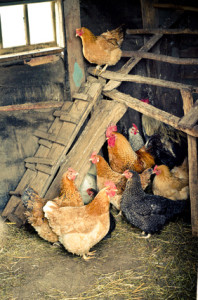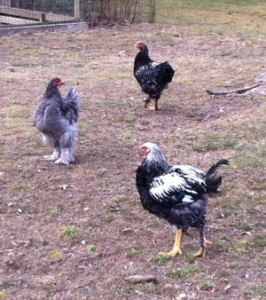 In certain hip, locavore, foodie parts of the country (Brooklyn, Berkeley, Cambridge, etc.) the trend recently has been to raise your own chickens. While the Accidental Locavore has thought (briefly) about it, and admired the beautiful exotic chickens at Brykill Farms, you have to eat an awful lot of eggs to make it worthwhile. And from what I know from people that have them, it’s more work than just letting the birds run around the yard looking good and eating bugs.
In certain hip, locavore, foodie parts of the country (Brooklyn, Berkeley, Cambridge, etc.) the trend recently has been to raise your own chickens. While the Accidental Locavore has thought (briefly) about it, and admired the beautiful exotic chickens at Brykill Farms, you have to eat an awful lot of eggs to make it worthwhile. And from what I know from people that have them, it’s more work than just letting the birds run around the yard looking good and eating bugs.
 But that hasn’t stopped a lot of people from becoming urban chicken farmers, creating new niche-marketing opportunities, along with some unforeseen causalities. You can buy decorator chicken coops (fixed or movable), or if you have commitment issues you can rent chickens complete with coops and give them back when the weather turns nasty. If you’ve overdone it, or are extremely competitive, you can get your coop on the annual coop tour in places like Austin, Texas.
But that hasn’t stopped a lot of people from becoming urban chicken farmers, creating new niche-marketing opportunities, along with some unforeseen causalities. You can buy decorator chicken coops (fixed or movable), or if you have commitment issues you can rent chickens complete with coops and give them back when the weather turns nasty. If you’ve overdone it, or are extremely competitive, you can get your coop on the annual coop tour in places like Austin, Texas.
 Once you’ve got the birds and the coop, how about outfitting them? You can dress your bird with frocks, diapers or what seems to be an urban no-brainer — a reflective vest in your choice of colors. There are magazines, even a “Dummies” guide devoted to raising urban birds and when you tire of that, you can read “Chick -lit“ to your brood. But what happens when our metropolitan farmers have too much on their plates?
Once you’ve got the birds and the coop, how about outfitting them? You can dress your bird with frocks, diapers or what seems to be an urban no-brainer — a reflective vest in your choice of colors. There are magazines, even a “Dummies” guide devoted to raising urban birds and when you tire of that, you can read “Chick -lit“ to your brood. But what happens when our metropolitan farmers have too much on their plates?
 Ready for this? According to CBS San Francisco, in the Bay Area Animal Care and Control has a new and growing problem on their hands — homeless chickens. Turns out that rather than serve them up for dinner, when people have had enough of their chickens, they just kick them to the curb and let them fend for themselves (you’re picturing them begging on street corners, right?). Not to worry, there are rooster rescue groups along with opportunities to build housing for homeless chickens. Habitat for Hens anyone?
Ready for this? According to CBS San Francisco, in the Bay Area Animal Care and Control has a new and growing problem on their hands — homeless chickens. Turns out that rather than serve them up for dinner, when people have had enough of their chickens, they just kick them to the curb and let them fend for themselves (you’re picturing them begging on street corners, right?). Not to worry, there are rooster rescue groups along with opportunities to build housing for homeless chickens. Habitat for Hens anyone?
The photo of the safety vests is from their website, with thanks.
Thanks! I actually post there on a semi-regular basis. Interesting about the chickens living 12-15 years! I never think of birds living that long, but I guess that’s why dishes like coq au vin exist!
Congrats on this post getting picked up by HuffPost!
A couple weeks ago in order to backup my stance on knowing where your food comes from, I went to a chicken processing class (I’m writing a post about it) on at Primal Pastures, a farm that specializes in responsibly raised, grass fed, free range chickens. The one thing that I was shocked to learn and may explain all the chickens on the loose, is that egg-layers are only productive for 2 to 3 years. However chicken can live as long as 12 to 15 years! If someone is to “grow their own eggs” they better be ready for supporting their pet for many years or learn to dispatch them and make a really great broth! (Egg layers are not so great to eat as they are tough and stringy). Great post, Anne!